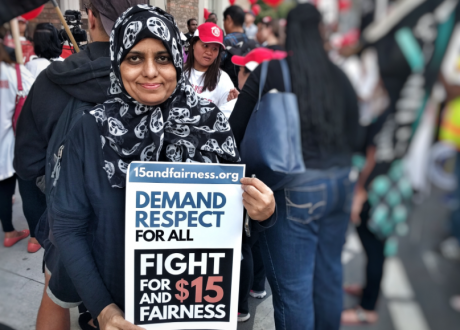Shared
You are here
Fighting racism and Islamophobia through the struggle for $15 and Fairness

September 13, 2017
Alia Karim interviewed Malka Paracha, a Muslim worker and trade union activist at York University, about overcoming Islamophobia in her workplace.
Racism on college and university campuses comes in many forms. The past year has seen a dramatic upsurge in hate-crimes and open racist sentiment across North American schools. On my campus, York University, we’ve seen ‘alt-right’ posters, swastika drawings, racial profiling, violent acts against Black students and Islamophobia. Such racist acts have sparked discussions about how to resist racism that we experience on our campuses.
One of the biggest fights against racism in the past year happened in Unite Here Local 75’s strike for a $15 starting wage and decent work conditions at York. Aramark food service workers, mostly women of colour, faced daily harassment by management who yelled at them, pushed them to work harder, followed them on their breaks (even following them to the washroom), and cut their hours if they didn’t comply with employer demands.
Campus food service workers like other workers in custodial roles, grounds-keeping, and low-paid secretarial roles are dispropotionately racialized in the post-secondary education sector. Racialized workers remain underrepresented among tenured faculty members, deans, provosts and presidents.
Unite Here Local 75’s strike bridged the connection between the demand for respect, in this case taking a strong stance against anti-black racism and Islamophobia, and higher wages and better work benefits. Far too often workers, especially those in precarious employment, are singled out for racist and Islamophobic harassment, without access to workplace protections.
I spoke to Malka Paracha, a worker at Freshii who took a lead role in Unite Here Local 75’s strike. As a visible Muslim who wears a hijab, Paracha was told by her manager that she wouldn’t be promoted to a higher position because she didn’t look “presentable”. Once she was even told to put on lipstick. Despite her higher education degree from Peshawar University in Pakistan, and getting a skilled visa, she has been denied promotions to an assistant management positions at Aramark. On a regular basis Paracha was also harassed for going to pray on her work breaks. Managers told her to come back quicker even though she insisted that her breaks were free time where she could go where she needed to.
Not only was she singled out but she noticed that her manager divided workers based on racial bias. “They made groups of us–Indians, Pakistanis, Filipinos, etc.” Management would favour certain groups of workers and pressure others to work harder. Over years, the favouritism of some and discrimination toward others, along with the consistent pressure to work harder and faster, reached a breaking point and culminated with a strike.
Paracha said that the support of students and the York community during the strike heightened their demand for respect and an end to racism in the workplace. At strike rallies, workers explained how they faced racism which alerted students to discrimination against workers and called them to act against it, and provoked a shared struggle with students who experienced similar forms of racism and Islamophobia. Public attention to the strike created immense pressure on management.
Paracha said that she always wanted to speak out at work before the strike, but herself and her co-workers simply didn’t have confidence. “Before we didn’t know to fight back against any violation of human rights or discrimination”, she claimed. That changed with the strike. She explained: “With the help of student power we could fight back harder, 100%. We learned how to fight back. It was a learning period for us–to learn how to fight for our rights. Students were the encouragement”.
The unity of students and workers at York relates well to what socialist politician Kshama Sawant recently said about the Fight for $15 in Seattle:
“The only reason it became such a historic victory in Seattle was because black, brown, white workers all rejected that false divisiveness. Workers of color and white workers recognized — and we wouldn’t have won if they hadn’t — that we have to fight for this together, because our fates are interlinked.”
At York, workers at Aramark began to unite together, and with students and other unions on campus they created a stronger force against Aramark management and the York administration.
Unite Here Local 75 won a $15 starting wage in March 2018, improvements in contract language which will protect union work and breaks, and the same health and dental benefits for full-time and part-time workers. Their strike victory is a huge win for racialized workers in low-wage industries and shows the potential to overcome racist divisions through a shared fightback that brings workers and their communities together.
But Paracha insists that the fight against racism is a constant struggle. “We need to keep working on this. We can’t let it go”. She’s keen to organize more meetings and rallies to strengthen the fight for $15 and Fairness and her union’s work.
Now is the time to build even more momentum for $15 and Fairness and fight the intimidation and fear presented by the alt-right movement and racist movements in our workplaces and campuses. Part of that fight is right on our campuses.
Join the $15 and Fairness Campus Assembly, September 15-16 at the University of Toronto to talk about campus organizing and resisting racism, Islamophobia, and anti-Semitism in the workplace! Register now: Bit.ly/15FCampus
This is shared from rankandfile.ca
Section:










